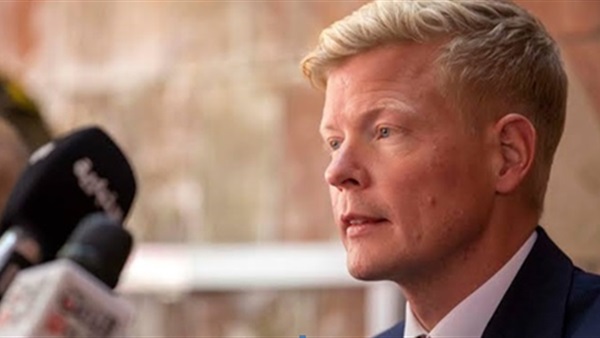Do Grundberg's visits contribute to resolving the Yemeni crisis?

Three weeks after a visit by UN Envoy to Yemen Hans
Grundberg to Sanaa on January 16, he went to the interim capital, Aden, in
southern Yemen, on February 8 and met with a number of leaders of the Yemeni
Presidential Council headed by Rashad Al-Alimi. During those visits, whether
with the Houthi leaders or the legitimate government, they discussed
developments in the Yemeni file and the UN efforts made with regional and international
countries concerned with resolving the crisis, which has entered its ninth
year.
Houthi obstructions
Although this visit is not Grundberg's first, especially
since the end of the extension of the ceasefire in early October, the parties
to the Yemeni conflict have not yet reached a solution regarding the settlement
of the crisis, or at least a return to the humanitarian ceasefire.
This is due to the militia's continued refusal to renew the
ceasefire for the fourth time, without fulfilling their alleged conditions,
especially the item related to paying the salaries of all state employees in
the Houthi-controlled areas from oil and gas revenues in the liberated areas
under the control of the legitimate government.
Accordingly, some Yemeni parties were counting on the visit
made by Grundberg to Sanaa to hold extensive meetings with the Houthi leaders
and then provide a briefing to the UN Security Council on the developments of
the Yemeni crisis to advance the path of a political solution, but a few days
after that visit, military escalations renewed again between the forces of the
legitimate government and the Houthi militants, with the latter hinting at a
willingness to engage in any military battle if its demands were not met. This
explains why, on February 8, coinciding with Grundberg's visit to Aden, the
militia organized a large military parade in the city of Hodeidah, during which
drones and naval mines were displayed. This reflects the militia’s insistence
on obstructing UN moves to try to achieve any gains by putting pressure on the
other parties to the conflict and the UN, especially since the leaders in Aden,
headed by Rashad Al-Alimi, confirmed during their meeting with the UN envoy
that the legitimate Yemeni government is keen to provide all facilities and to
deal with all regional and international endeavors made to launch a political
process led by the United Nations that meets the aspirations of the Yemeni
people to achieve security and stability.
UN moves
It should be noted that, prior to visiting to the interim
capital, Aden, the UN envoy traveled to the Kingdom of Saudi Arabia, where he
held talks with the Gulf Cooperation Council Secretary-General Jasem Mohamed
Al-Budaiwi and a number of Saudi officials about expanding the package of economic
and humanitarian aid to the Yemeni people, in addition to emphasizing the need
for a ceasefire in the country and reaching a comprehensive political solution
to end the crisis.
There is news that Grundberg will visit the Omani capital,
Muscat, during the next few days to seek the success of the negotiations
between the parties to the Yemeni conflict, especially since the Sultanate of
Oman has undertaken mediation efforts between the Houthis and the legitimate
government, which a number of observers described as the UN’s keenness to
resolve the Yemeni crisis.
Houthi gains
Yemeni political researcher Mahmoud al-Taher explained that
the UN envoy’s many visits are useless, during which he tries to put pressure
on the Yemeni government to obtain more gains for the Houthi militia, as he
does not play his role, which should be to put pressure on the Houthi militia
to comply with the international community's desire to end the war, but rather
it exploits this desire in order to obtain political gains and to declare
military victory over the Arab coalition and the Yemeni government.
Taher pointed out in a special statement to the Reference
that the visits of the UN envoy will not contribute to resolving the files or
entering into direct negotiations between the Yemeni government and the
Houthis.
Impossible conditions
For his part, Yemeni political researcher Dr. Mutahar
al-Raida said that UN Envoy Hans Grundberg carries in his bag impossible
conditions that were presented to him by the Houthi militia for Rashad Al-Alimi
to approve and submit to the militia's intransigence, just like previous
agreements and concessions. Therefore, the crisis continues and the citizens
who are lost in the midst of international and regional tensions and the
leadership of a weak state that has not been able to provide them with any
stability or life.
Raida made it clear that the undeclared agreements that are
taking place behind the scenes between foreign parties and the Houthis will not
bear fruit on the ground, because the militia's decision is not in their hands
and has not been in their hands for the past eight years, just as the
legitimate government hammered the iron while it was hot against the Houthi
militia by drawing the world's attention to the militia’s intransigence to the
agreement and the failure to reach peaceful solutions by which the blood of
Yemenis would be spared.
He added that this opportunity will not be compensated,
especially after US Special Envoy to Yemen Tim Lenderking announced that his
country is putting its weight on a political solution, which is the only way to
end the Yemeni crisis, and therefore the legitimate government must put the
ball in its rightful place during this period to expose the Houthis before the
world.









